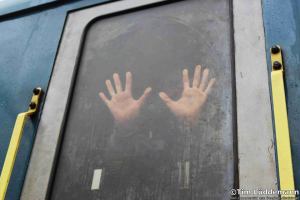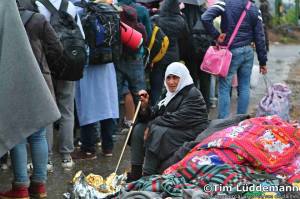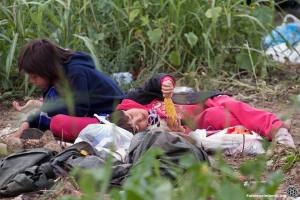The following is a blog post by Milda Bandzaite from AIWS. They are active in the vegan movement and against vivisection, animals in circuses as well as in many other animal-causes. They also organise for human liberation. You might remember our interview with Milda about their exciting neurodiversity project which is coming out soon. Milda is also active in the MOGaI movement and with the Antifa/Anarchist crowd. This post specifically, is a report about their experience at the Croatian-Serbian border where Milda was organising in solidarity with the refugees arriving there. They describe their impressions of the situation and also offer a critique of charity, which is very much needed in all our movements.
We are very grateful, Milda, that you chose to share your experience with us and we thank you for all the hard work and dedication you put into this world.
No Borders, No States! Solidarity, Not Charity!
While European leaders are debating and trying to find a solution to the so called “refugee crises” more and more self organised activists from around the world decide to take action on their own and show solidarity with those who need it the most. One of the places they go is the Serbian/Croatian/Hungarian borders. Every day thousands of refugees are fleeing the horrors of war crossing the borders to their new, and hopefully better, life in Europe.
But how are they greeted here? You’d imagine the Western world that is always so keen to talk about human rights, humanitarian aid and other “progressive” issues, would do everything in their power to make sure that those who walked miles and miles, sometimes bear-feet without any supplies, those who have been traumatized by their experiences both back home and during this dangerous journey, are warmly welcomed and get all needed help and support. But no – wired fences, an everyday increasing military presence and refugee camps that are bleak, unhygienic and cold, completely inhumane, that’s the reality thousands of refugees have to face every day.
One of the first refugees I got to talk to was an 8-year-old boy, who almost didn’t speak English, but still with his sister’s help was able to tell me about his dream to live in Sweden “where no one kills each other”. Together we drew a picture, and his picture told much more than any words ever could, leaving the horrors of war behind and traveling to the bright future. Their brother and mother died during the bombing back home, they told me. “Everyone in Europe is good, they are here to help us, so why don’t they let us go?”, they kept asking me, but I didn’t have an answer.
The very same night thousands refugees who waited for hours and hours for buses to take them from Babska to the Opatovac camp had to walk 17 kilometers in the cold with no lighting. There were children, women, people in wheelchairs being pushed by their relatives. The little boy I talked to earlier had to walk too, be brave I told him. “I will”, he smiled. And I was left wondering what the world’s reaction would be if by any chance a little boy from the Western world was forced to walk for days and sleep on the cold concrete without blankets just to reach safety?
Not only me, but many other activists and journalists who had a possibility to witness everyday reality at border crossings and refugee camps, described the conditions in these camps as inhumane. People are not allowed to leave, they have no rights and are treated like they don’t matter at all. The power structures are so linked together, that every time when we tried to challenge them we received backlash, asking to leave our politics behind and just give aid to the refugees, as that’s what is need.
In these situations support is important, it’s so extremely important, but it is even more important to realise that this support and help shouldn’t be charitable. The idea of charity is harmful in itself – it always puts those of us who provide the support in a power position and simply makes us feel good for helping out. It does not challenge the roots of why the issues arose in the first place, charity just tries to ease the symptoms caused by the oppression and system itself. At the same time by showing solidarity we are abolishing the idea of being in power and realising that our struggles are connected. It’s like saying we are here because we feel your struggle, not necessary understand how much you had to go through, but we are here as your allies. Yes, right, we are not here to throw some left overs at you, but to share what we have. There are no leaders, there are no bosses, just all of us – human beings – fighting the system together and demanding to have the world with no borders, where everyone is free to move as they wish.
And to end this post I will get a bit more personal and emotional, this morning I was telling my grandmother (she is a survivor of the Soviet occupation in Lithuania, she and her family were deported to Siberia, where her dad was tortured and killed in the prison) about what I have witnessed at the borders, how the authorities treat refugees like they are not even human beings. I also told her about the situation in Zakany and how people sometimes have to wait in the trains for hours without food and water (it depends on the police if activists are allowed to distribute food through the windows) before it moves.
And then she told me how seeing the situation at borders on TV and listening to me reminds her the time when she was deported and had to spend days in the trains, just at that time there was no one to show solidarity and everyone who died during the journey was just thrown away on the train tracks.
That is what makes me even more angry. How does it happen that we can’t learn from the history and we repeat almost the same mistakes again and again? How does it happen that we have enough money and power to fund wars, but can’t find a bit of compassion to those who have just experienced the horrors of war and are searching for a place where finally they could be safe?
Solidarity – not charity, because together we are strong!
Here are some visual impressions:
Curtesy of Tim Lüddemann:
Impressions from Babska/Opatovac/Jemena, curtesy of Fotomovimiento:










